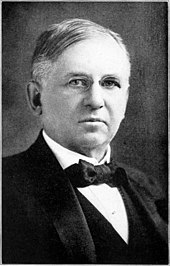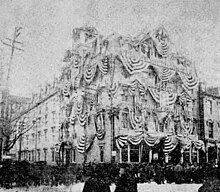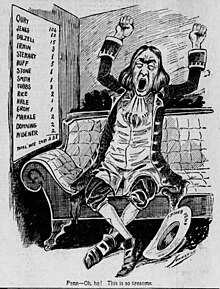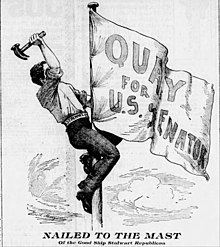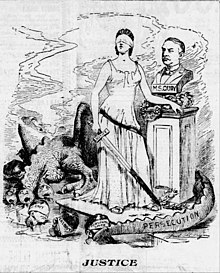1899 United States Senate election in Pennsylvania
Prominent among the anti-Quay forces was Philadelphia businessman John Wanamaker, who had been defeated for the Republican nominations for senator in 1897 and governor in 1898 through Quay's influence.
Stone appointed Quay to the vacancy, but the U.S. Senate refused to seat him by one vote, and the senatorship remained vacant until 1901.
Quay blamed his fellow Republican political boss, Mark Hanna of Ohio, for the defeat in the Senate, and gained revenge at the 1900 Republican National Convention by supporting Thomas C. Platt's scheme to politically sideline Governor Theodore Roosevelt of New York by making him vice president, over Hanna's strong objection.
[2] If a vacancy occurred when the legislature was not in session, the governor could make a temporary appointment to serve until lawmakers convened.
He served as an officer in the Union Army,[5] and was awarded the Congressional Medal of Honor for his actions at the 1862 Battle of Fredericksburg.
[12] His speeches brought the issue of bossism home to the voters of Pennsylvania, and helped elect Democrats or anti-Quay Republicans.
[16] The information had been available for months; according to Quay biographer James Kehl, the indictment was timed to have had the greatest effect on the upcoming elections.
[17] The anti-Quay political forces did their best to capitalize on the claims of corruption against Quay and his associates, attempting to deny him re-election while appearing to remain loyal Republicans in the public eye.
[18] The trial was repeatedly delayed in late 1898, leading Quay to appeal to the Supreme Court of Pennsylvania to get a judge assigned, wanting the matter disposed of before the legislative balloting for Senate began in January.
[20] The legislature that was to convene in January 1899 consisted of 164 Republicans, 84 Democrats and 6 Fusionists,[21] the last being elected across party lines by an anti-Quay coalition.
[30] That night, Quay's term in the Senate expired, and the seat became vacant; only Penrose represented Pennsylvania in the upper house.
[5][31] On March 15, The New York Times reported that the deadlock was likely to persist to the end of the session, and that the Pennsylvania Senate seat would likely go unfilled when Congress next convened in December, even by a gubernatorial appointee, as the Senate had usually rejected attempts to fill a seat by appointment when a state legislature had failed to choose.
This was along the lines that Quay urged in a letter to his supporters, "To temporize with those persons who for three months have prevented the election of a Senator in Pennsylvania would extricate them from the abyss into which they have plunged.
"[33] The Democrats refused to reach across the aisle to the anti-Quay Republicans to elect a compromise candidate, remaining loyal to Jenks.
To those directly involved, the frantic efforts to make successful combinations or convert individual legislators turned the protracted struggle into a reign of terror—physically, mentally and morally.
At the meeting they passed a resolution stating that Quay could not be elected, and Magee nominated Benjamin F. Jones, former chairman of the Republican National Committee, for senator.
[27] On the final ballot, four legislators were paired and state senator Alexander L. Hawkins was absent, as he was serving with his regiment in the Philippines.
[37] The following day, the legislature formally adjourned, leaving the Senate seat empty, and in a Philadelphia courtroom, Quay was acquitted of the charges.
[40] According to Kehl, Stone would have been better advised to recall the legislature into special session in the hope the acquittal would cause them to reach a decision, but the governor wanted to rebuke Wanamaker and endorse Quay.
[38] Wanamaker mounted a campaign to get the Senate to refuse to seat Quay when the new congressional session began in December 1899.
Platt wanted to politically sideline his state's governor, Theodore Roosevelt, by making him vice president.
[54] The fact that he was instrumental in the nomination of Roosevelt, seen as a war hero and reformer, boosted Quay, according to Kehl, "rebuild[ing] his tarnished image in the Keystone State".
[55] Quay spent the 1900 campaign season giving speeches for legislative candidates who would vote for his election when the legislature convened again in 1901.
[17] When the legislature convened, Quay was able to secure, possibly through bribery, the votes of one Democrat and seven Republicans previously pledged against him to gain a slim majority.
"[58] Quay died in 1904, still in office; Penrose controlled the state Republican Party until his own death in 1921 put an end to the Cameron-Quay-Penrose machine, one of the longest-lived and most powerful in the nation.
